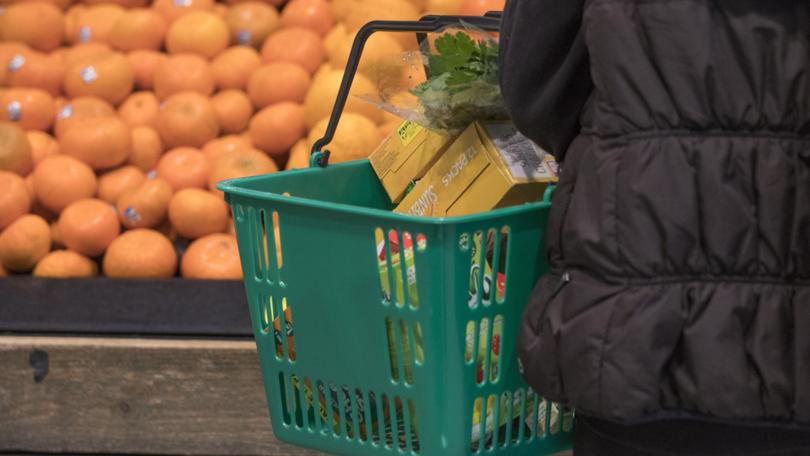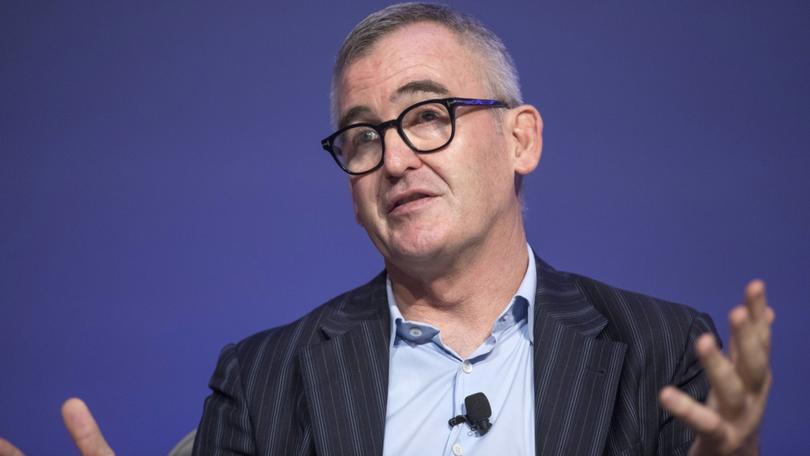Woolworths sales hit $16.8b as supermarkets lift but Big W struggles as shoppers deal with cost-of-living pain
Woolworths shares have plunged to their lowest level in four years after reporting sluggish supermarket sales growth and the fourth consecutive quarter of negative sales for its discount department store Big W.

Woolworths shares have plunged to their lowest level in four years after reporting sluggish supermarket sales growth and the fourth consecutive quarter of negative sales for its discount department store Big W.
Compounding what chief executive Brad Banducci said was a “challenging” quarter amid ongoing political and public pressure around prices and corporate conduct was a growing proportion of customers feeling the squeeze of higher costs of living as increased rents, mortgages and utilities costs bite.
Mr Banducci expects the year ahead also will be challenging.
Sign up to The Nightly's newsletters.
Get the first look at the digital newspaper, curated daily stories and breaking headlines delivered to your inbox.
By continuing you agree to our Terms and Privacy Policy.“Customers who often shop in our more affluent stores — often young singles and couples — all of a sudden they’re spending on conscious products,” Mr Banducci said.
“What you’re seeing is a lift in frequency of shopping and a slightly smaller basket.
“Consumers are shopping too in a very pronounced way to fixed-dollar budgets, which is quite different to the way they might have shopped before.”
Mr Banducci also conceded his company had been “out-traded” in the third quarter of the financial year, with supermarket sales growth of 1.5 per cent lower than 5.1 per cent for arch-rival Coles.
Coles ran a children’s collectables program in the first quarter which it said boosted sales, whereas Woolworths did not — but had the year prior.
But analysts were frustrated at Woolworths’ sales growth over the past two years and are now questioning its strategy ahead of Mr Banducci’s September retirement. He will replaced by long-term executive Amanda Bardwell.
Shares closed at $30.50, the lowest since May 2020.
Mr Banducci said that in products like pet care, household care and personal care, which had relatively higher prices, “customers are becoming much more promotionally sensitive”, which included whether to buy at Woolworths, Coles, Kmart, Big W, Amazon or Bunnings.
Mr Banducci said there had also been, at the tail end of the quarter, a notable pick-up in people dining-in at home, which had been expected for some time. Mexican food products had experienced the highest growth, leading to similar growth in mince meat.
Woolworths reported that average prices fell 0.2 per cent year-on-year, driven by fruit and vegetables and meat. Mr Banducci acknowledged customers were fatigued by inflation and said the company had more work to do to deliver lower prices across shelves across the business.
“There’s more work to do to make sure it’s true for every customer, not just the average customer, and try to really work that across the whole shop,” he said.
“We have actually started to see shelf prices fall and we need to make sure we get more shelf price reductions versus delivering value through promotion ... the team are working very hard on that.”
Mr Banducci added dairy prices, particularly in cheese and milk, had started to come back to “very low single digit inflation”.
Promotions were more effective for products purchased less frequency than on every day essentials, he said, but promotions were “not a panacea for how we should deliver value to consumers”.
“We need to get that balance with everyday prices on everyday items and then promotions on less frequent items ... or indulgences,” he said.
Over the quarter, Woolworths’ best performing division was its business sales unit, which increased 3.2 per cent to a touch under $1.1b. Sales at Big W slipped 4.1 per cent year on year to $1b, compared to almost $1.05b a year ago.
“We expect trading conditions to be challenging for the next 12 months due to competition for customer shopping baskets and as inflation returns to a very low single digit range,” Mr Banducci said.

For the first time, Woolworths also reported sales from its newly-acquired Petstock division, of which it owns 55 per cent. Sales in the quarter totalled $238 million, which Mr Banducci said was marginally below the year prior, reflecting lower sales in discretionary retail.
In supermarkets, sales were particularly strong for long-life products, such as frozen foods, pantry and household care, up 5.6 per cent, and fresh food was up 1.8 per cent, with bakery, seafood and chilled products doing well during Easter.
Mr Banducci echoed Coles boss Leah Weckert’s comments earlier this week that a growing proportion of customers were “cross-shopping”, buying more own brand products and were looking for more ways to save.
Mr Banducci said sales at Big W had been affected particularly by clothing and homewares, with higher price points challenged, and some customers had been trading down to cheaper items, deferring purchases or not buying at all.
“Specific examples during the quarter include the share of Lego sold under $20 increasing from around a third of Lego sales last year to around half this year, and our kids’ bike promotion led to around a 50 per cent increase kids’ bikes sold under $100,” he said. “In contrast, we have seen material sales declines in our ‘best’ vacuum cleaners.”
Elsewhere, sales increased marginally at the company’s struggling New Zealand supermarkets division by 0.2 per cent year-on-year.
